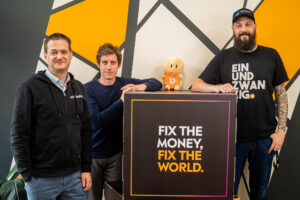Talent Talks Vol. 2: “It is not the size of a company that matters but rather the company culture”
At a certain point, every working person wonders whether to opt for a position in a big corporation or embark on a journey by choosing a startup to join. What are the costs and what are the benefits? Actually, what is the difference between the two types of career paths and working environments? How do they keep their employees productive and happy at the time of a pandemic?
Trending Topics SEE’s second edition of the Talent Talks’ talk show was dedicated to these questions. Under the title ‘Impact & Mess vs. Structure & No Stress!‘’ the hybrid event explored whether startups or corporates are a better place for work, when and for whom. The hybrid panel discussion broadcasted live from Launchee was joined by four people from different organizations, some of whom with backgrounds in both worlds. To share some experience joined us Victor Danchev, the mission manager at spacetech startup EnduroSat, Ivelina Petkova, IT project manager at document management startup Documaster, Thomas Metz, the corporate expert who has spent his whole career at tech giant Bosch and is currently leading the Bosch Engineering Center in Sofia (where they work on autonomous driving), and Severina Mitsova, the HR manager of AtScale, the US intelligence data virtualization company that has attracted $95 million of external capital and last year they decided to invest 25 of them in their engineering office here in Bulgaria.
Skipping the typical for events PR cliches, the four discussed their experience in corporations and startups, talked about the visibility of contribution, impact, competitiveness, friendships at work, salaries, stock options. In other words, demystified the ‘Impact & Mess’ and ‘Structure & No Stress’ beliefs. Those who missed it (or would like to watch it again), can see it here.
A few highlights
The four panelists were unanimous that the human factor is crucial for a company regardless of its size and structure.
“Even though I do see people’s work, their projects, and the amazing progress that they’re making, I still put the time and effort to talk to them in the kitchen or in the corridors because it is important, ” says Thomas Metz.
Of course, we couldn’t skip catching upon the unusual situation from the past months. The COVID-19 situation has rapidly increased the rate at which digitalization at the workplace is happening. When it comes to employees, some major problems occur. For many people, decreased team cohesiveness may result in lower productivity. The lack of communication with people can have undesirable consequences for an employee’s mental state such as loneliness, anxiety, and overall dissatisfaction. The sheer possibility that an employee might feel like that is a great concern for managers. “Talk with each other. Ask them for their kids, even for the name of their pets,” comments Ivelina Petkova and stresses on the importance of building a connection with the employees. Team building and mentorship are working practices for large companies such as Bosch, according to Thomas Metz. And all this is important also beyond the lockdown and should be seen as best practice anyway. Some argue, it’s easier to maintain such spirit in culture in smaller companies. But it’s a matter of structure actually, as Metz highlights – event though Bosch is a huge global company, the local engineer team operates in a close to startup agile setup.
Easier to recognize talent in small companies?
“In a small company, it’s a lot easier to recognize talent,” Severina Mitsova from AtScale.
Recognizing the potential of a person is a crucial step towards developing his/her skills and knowledge to make him/her more valuable for the company. And what is potential without motivation? Mitsova also comments that being motivated is of great importance for the overall impact of an employee. This is where smaller companies have a strategic advantage: “In the corporate world, usually more noticeable is the contribution of a team but not of a single member. That can be very disruptive because one of the most motivating experiences for an employee is to be recognized by peers or his manager,” she adds.
“Startups are growing with people but people are also growing with startups,” explains Victor Danchev, meaning that the impact of a person is more visible in a startup and that the person feels more in control and empowered.
Another burning topic during the discussion was whether startups could provide as good training for its employees as a big corporation. Victor Danchev was quick to answer: “When we see that a person has passion and takes interest in something, we put an effort to push the person towards developing in this sphere. Sometimes a person from the team who has expertise teaches the new member. Structured learning is not always the best learning.”
Is Work-Life balance impossible?
Given the blurred lines and boundaries in and after the lockdown, in the new remote and office-everywhere era, work-life balance has become a topic more important than ever. Is it more easily achievable in startups or in corporations and what is the recipe for surviving from burnout in the startup environment? Thomas Metz restated that no matter whether one works in a startup or a corporation the balance is easily achievable when you have a purpose, even though the personal pressure and the responsibility in the corporate environment are not as heavy as in the startup environment where one person wears multiple hats.
Still, when it comes to the final decision whether to choose a startup over a corporate career or vice versa, the panelists classified the mindset of a person as the most important factor influencing the important decision.
Ivelina Petkova: “One should start by exploring their own beliefs and values in order to understand what he/she is more comfortable with.”
If someone is more comfortable with a more structured firm, with processes and documentation, then enterprise would perhaps be the better choice for him/her. In case a person is more creative and needs his/her space, startups are a better choice as they usually offer an out-of-the-box working environment and a diverse weekly schedule. In Ivelina’s opinion, a young person will perhaps feel more comfortable working for a startup. The reason behind this is that individual impact is seen much easier in a small company, as already mentioned.
Whether or not one should choose a corporation over a startup is a matter of personal choice. Yet, the panelists discussed many angles that cannot be seen if one is lacking experience in working for any of the two types of enterprise. You can rewatch the discussion here and learn more about the companies in which our panelists work below.
What talent-related topics would you like to see discussed in future events? Mail us at newsroom@trendingtopics.bg
Get to know the companies:
Space Data Gateway: EnduroSat’s Latest EU-Backed Project To Open Up Opportunities For More Startups
AtScale: Inside The Bulgarian Cloud Storage History, Two Exits And A $25M Investment





























